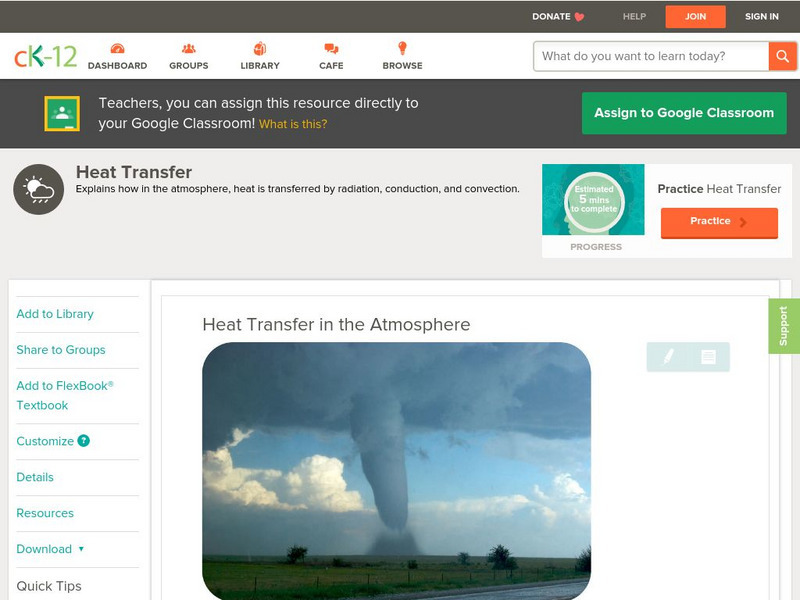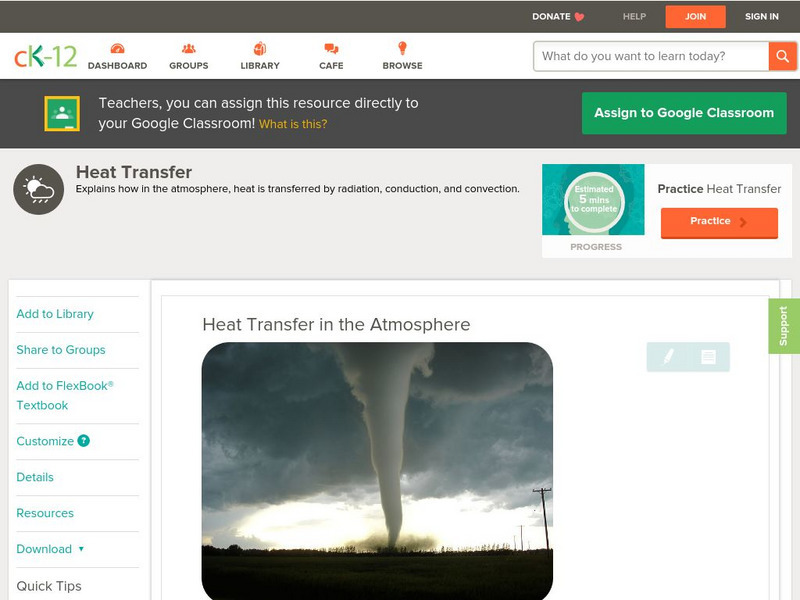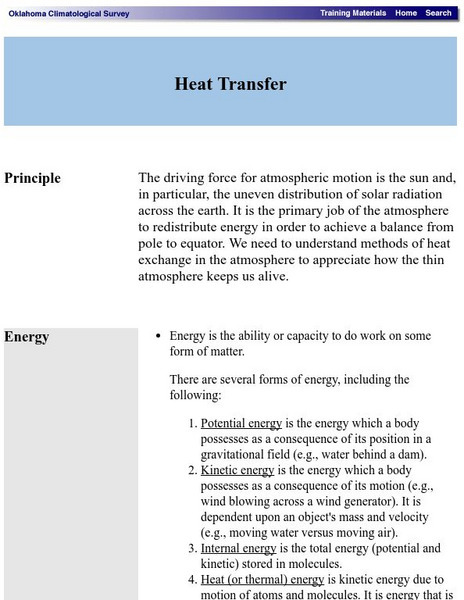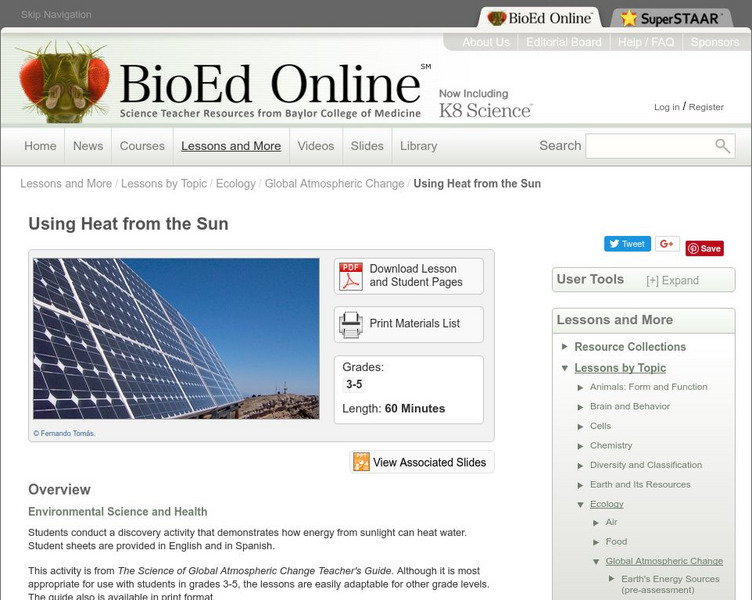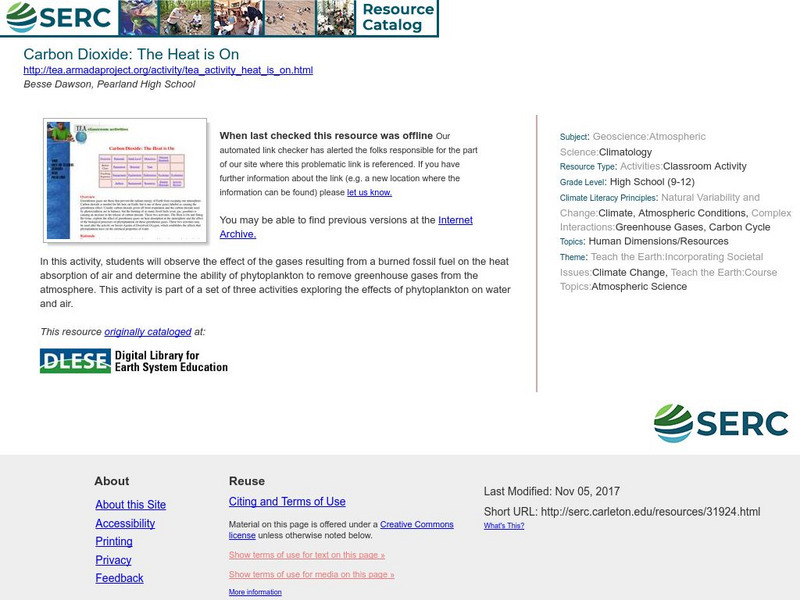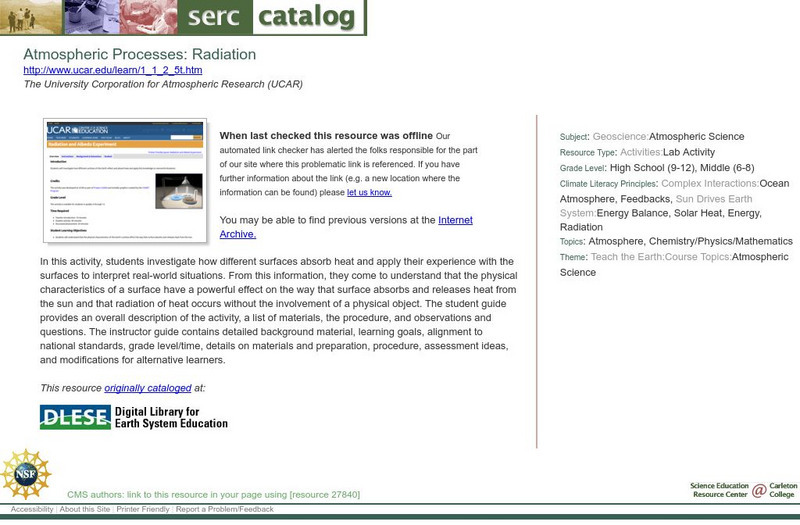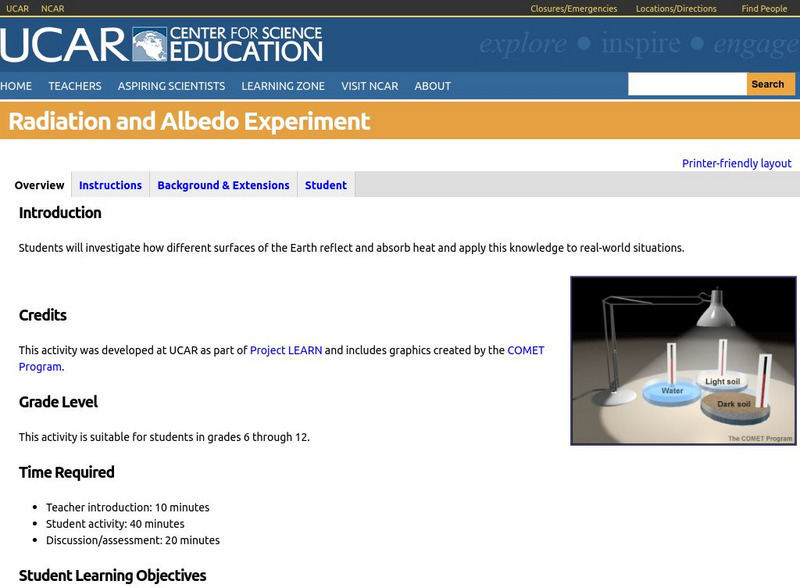Hi, what do you want to do?
CK-12 Foundation
Ck 12: Earth Science: Heat Transfer in the Atmosphere
[Free Registration/Login may be required to access all resource tools.] How heat is transferred in the atmosphere.
CK-12 Foundation
Ck 12: Earth Science: Heat Transfer in the Atmosphere Study Guide
Understand heat transfer in the atmosphere using this study guide.
CK-12 Foundation
Ck 12: Earth Science: Heat Transfer in the Atmosphere
[Free Registration/Login may be required to access all resource tools.] How heat is transferred in the atmosphere.
CK-12 Foundation
Ck 12: Earth Science: Temperature and Heat in the Atmosphere
[Free Registration/Login may be required to access all resource tools.] Overview of temperature and heat.
University Corporation for Atmospheric Research
Ucar: Introduction to the Atmosphere
A detailed overview of the Earth's atmosphere, with explanations about atmospheric properties, the structure of the atmosphere, its four layers, atmospheric processes, energy heat transfer, conduction and convection, and radiation. All...
National Weather Service
National Weather Service: Jet Stream: The Atmosphere
Learn about the atmosphere, it's make-up, the layers, the hydrologic cycle and more. The National Weather Service presents this site, including learning lessons and review questions.
CK-12 Foundation
Ck 12: Earth Science: Temperature and Heat in the Atmosphere Study Guide
[Free Registration/Login may be required to access all resource tools.] Discusses the characteristics of temperature and heat and how they behave. Includes some questions to check for understanding.
University of Colorado
University of Colorado: Ph Et Interactive Simulations: The Greenhouse Effect
How do greenhouse gases affect the climate? Explore the atmosphere during the ice age and today.
Oklahoma Mesonet
University of Oklahoma: Overview of Meteorology
The University of Oklahoma explores numerous types of weather and atmospheric changes, as well as the reasons behind them. Content details the four seasons, common meteorological variables, the vertical structure of the atmosphere, how...
Other
Denver Museum of Nature and Science: What's the Weather Like Today? [Pdf]
Weather is all around us. We can see it, feel it, touch it, hear it, and even taste it. Weather is the condition of the atmosphere with respect to temperature, humidity, wind, and other factors. Some of the many weather conditions...
Oklahoma Mesonet
Oklahoma Climatological Survey: Heat Transfer
A discussion from the Oklahoma Climatological Survey of the thermal factors effecting the movement of air masses in the atmosphere. Numerous topics such as methods of heat transfer, latent heat, phase changes (including sublimation and...
Exploratorium
Exploratorium: Global Climate Change: Atmosphere
Use this site to explore real scientific data relating to the atmosphere. With this information you can gather evidence, test theories, and come to conclusions. Click on the data examples to view a full scale version.
University Corporation for Atmospheric Research
Ucar: A Global Look at Moving Air: Atmospheric Circulation
Even with disruptions like weather fronts and storms, there is a consistent pattern to how air moves around our planet's atmosphere. This pattern, called atmospheric circulation, is caused because the Sun heats the Earth more at the...
Enchanted Learning
Enchanted Learning: The Earth's Atmosphere
The Earth's atmosphere is a thin layer of gases that surrounds the Earth. It composed of 78% nitrogen, 21% oxygen, 0.9% argon, 0.03% carbon dioxide, and trace amounts of other gases. This thin gaseous layer insulates the Earth from...
BioEd Online
Bio Ed Online: Using Heat From the Sun
Learners investigate how solar energy can be harnessed to heat water. The lesson and accompanying PowerPoint can both be downloaded, and the student handout is provided in both English and Spanish.
BioEd Online
Bio Ed Online: Finding the Carbon in Sugar
Students learn that fossil fuels release energy when they are burned, and this takes the forms of light, heat, gases, etc. In this instructional activity they explore combustion with a candle and with sugar. The instructional activity...
Science Education Resource Center at Carleton College
Serc: Carbon Dioxide: The Heat Is On
In this activity, students will observe the effect of the gases resulting from a burned fossil fuel on the heat absorption of air and determine the ability of phytoplankton to remove greenhouse gases from the atmosphere. This activity is...
Other
Gorp: Using Clouds to Forecast the Weather
This resource provides information on the four main types of clouds that form in the atmosphere. There are high clouds, middle clouds, low clouds and clouds with vertical development.
Science Education Resource Center at Carleton College
Serc: Atmospheric Processes: Radiation
In this activity, students investigate how different surfaces absorb heat and apply their experience with the surfaces to interpret real-world situations. From this information, they come to understand that the physical characteristics...
University Corporation for Atmospheric Research
Ucar: Atmospheric Processes Conduction
This simple demonstration helps students understand the concept of conduction. Site includes background information, images, and lesson plans outlining the demonstration of conduction.
University Corporation for Atmospheric Research
Ucar: Atmospheric Processes Radiation
This site provides background information, images, and an activity to help students understand the concept of radiation. Includes both the student pages and a teachers guide with lesson plan.
CK-12 Foundation
Ck 12: Earth Science: Heat Budget of Planet Earth
[Free Registration/Login may be required to access all resource tools.] The balance of heat entering and exiting Earth's atmosphere.
PBS
Quest: How Do Greenhouse Gases Work?
Use this interactive infographic to learn about the function of greenhouse gases, and how they affect heat in the atmosphere.
University Corporation for Atmospheric Research
Ucar: Learn: The Greenhouse Effect
A detailed overview of the greenhouse effect, with explanations about Earth's atmosphere gases referred to as greenhouse gases, and the factors that influence the heat-trapping ability of a greenhouse. All information is reinforced...





